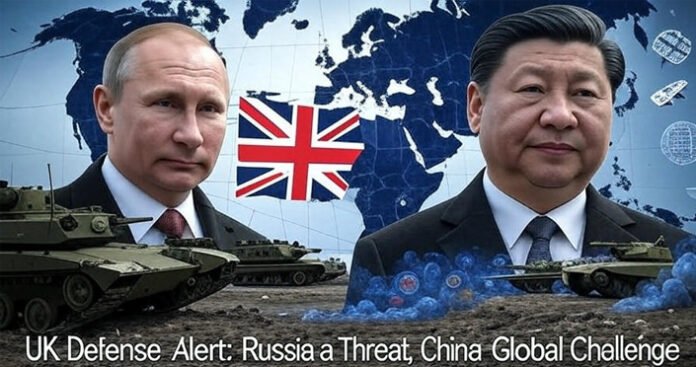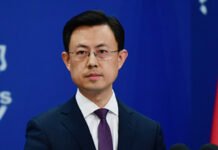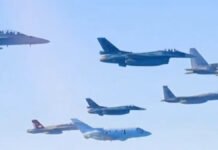
INVC NEWS
London – : Britain has issued a bold and urgent warning in its latest defense review, identifying Russia as a major global threat and labeling China as a complex and evolving challenge. The 130-page report, prepared under the leadership of former NATO Secretary General George Robertson, outlines the United Kingdom’s strategic 10-year military equipment and services roadmap. As global conflicts intensify, Britain is pivoting toward a more fortified and technologically advanced defense posture.
Russia Recognized as Primary Threat in UK Strategic Outlook
Russia’s continued aggression, particularly its ongoing invasion of Ukraine, features prominently in the defense review. The British government has openly labeled Russia as a principal threat to global security, warning that the Kremlin’s military ambitions extend beyond Ukraine and pose a wider challenge to NATO allies and democratic institutions worldwide.
The review emphasizes that Russia’s illegal and unprovoked war has fundamentally shifted Europe’s defense strategies. British officials assert that ignoring Moscow’s expansionist policies would be a mistake with potentially devastating consequences. Defense Secretary John Healey remarked that Putin’s war has transformed the strategic landscape, pushing allied nations to increase readiness, resilience, and response speed.
China Called a ‘Complex Challenge’ Due to Strategic Alliances
Unlike the outright condemnation of Russia, the report refers to China as a multifaceted and dynamic challenge. This distinction is crucial, as it acknowledges Beijing’s growing technological and military capabilities, its willingness to align with authoritarian regimes like Russia, Iran, and North Korea, and its efforts to influence the global order.
China’s collaborations with Moscow in economic, diplomatic, and security frameworks have raised red flags in Western capitals. The UK defense report highlights China’s gray-zone tactics, such as cyber operations, disinformation campaigns, and strategic infrastructure investments that undermine Western influence and alliances without triggering open conflict.
European Union Diplomats Echo Britain’s Concerns
Britain’s review aligns with growing concern across Europe. The EU’s top diplomat, Kaja Kallas, recently underscored the gravity of the Sino-Russian partnership, warning that their collective vision for global power realignment represents one of the greatest threats to the current international order.
Kallas pointed to public statements from Chinese and Russian leaders referencing changes “not seen in a hundred years”—a phrase Western analysts interpret as a signal for restructuring the global security framework to suit authoritarian interests. She urged democratic nations to be equally vigilant toward both Beijing and Moscow as the lines between economic strategy and military alliance blur.
UK to Build Six New Weapons Factories for Defense Modernization
To bolster national defense capabilities, the British government announced the construction of six new weapons and explosives factories. This initiative is part of a broader effort to modernize the UK’s defense industry and strengthen battlefield readiness.
The UK Ministry of Defense confirmed over £1 billion in investments in next-generation digital targeting technologies, positioning Britain at the forefront of military tech innovation. These technologies aim to provide British forces with superior operational agility, allowing them to strike farther, faster, and with precision.
Faster Connectivity and Integrated Warfare in Future Conflicts
Defense Secretary John Healey emphasized that modern warfare demands speed, connectivity, and integrated command systems. The new strategy focuses on linking military assets—ships, aircraft, tanks, and frontline operators—through a digital web that can instantly share battlefield intelligence and coordinate precise, real-time operations.
Healey stated, “We will give our armed forces the ability to act at unprecedented speed. We will connect ships, aircraft, tanks, and operators so they can share critical information instantly and strike at greater distances and faster.”
The strategic goal is to outpace adversaries by developing rapid-response capabilities, data-driven decision-making systems, and autonomous technologies to enhance survivability and lethality on the battlefield.
British Army’s Future Force Size Under Scrutiny
While the report is ambitious in its goals, it does not shy away from self-assessment and scrutiny. The review raises concerns about the current size and readiness of the British Army, suggesting that adjustments may be necessary to meet the defense challenges of the coming decade.
There are internal discussions about whether the UK military force is adequately staffed, trained, and resourced to defend national interests and support allies in the event of escalating global conflicts.
Global Alliances and NATO Coordination Remain Core Pillars
Britain reaffirmed its unwavering commitment to NATO and its role as a global security contributor. The defense review emphasizes multinational cooperation, intelligence sharing, and joint military exercises as critical tools to contain Russian aggression and counter China’s influence in strategic regions, including the Indo-Pacific and Eastern Europe.
By aligning its defense priorities with those of its allies, the UK aims to present a unified Western front against adversaries that seek to reshape international rules, diminish democratic values, and dominate global power structures.
Defense Industry Reboot to Match Evolving Global Threats
A key takeaway from the review is Britain’s readiness to completely overhaul its defense production infrastructure. From AI-powered targeting systems to enhanced missile development, the UK plans to prioritize technological superiority and manufacturing speed.
This transformation is expected to reduce dependence on foreign supply chains, promote domestic defense innovation, and ensure that the British military remains combat-ready across all domains—land, sea, air, cyber, and space.
Warning Signals for the World: Prepare for an Era of Multipolar Threats
With Russia’s aggression unabated, China’s strategic ambitions expanding, and alliances forming among authoritarian regimes, the world enters a more dangerous and unpredictable security environment. Britain’s defense review serves not just as a roadmap for domestic policy, but as a wake-up call for democratic nations worldwide.
By spotlighting real and present dangers, advocating rapid modernization, and committing to allied coordination, the United Kingdom is preparing to confront the complex warfare of the future—a future where speed, data, and diplomacy may be as critical as firepower.















